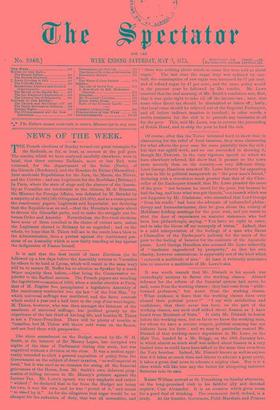Of course, after this the Tories laboured hard to show
that in clamouring for the relief of local taxation, they were clamouring for what affects the poor man far more painfully than the rich ; but that was uphill work, and no one succeeded in showing it, though Mr. Fawcett, in the very vigorous speech to which we have elsewhere referred, did show that it presses on the town more severely than on the country, —a very different thing. Lord George Hamilton attacked Mr. Lowe bitterly for appearing so late in life in political masquerade as "the poor man's friend," declaring with a truculence much greater than that of the Chan- cellor of the Exchequer himself, that Mr. Lowe pleaded the cause of the poor " not because he cared for the poor, but because he had the bag, and bore what was put therein,"—a remark which was not forgotten by Mr. Gladstone, who remarked that Lord George "from his cradle" had been the advocate of unbounded philan- thropy and humanitarianism, that he goes about the county of Middlesex holding meetings for the poor man, and yet wants to shut the door of repentance on maturer statesmen who had been less philanthropic, saying, "You have no right to enter, and to take the bloom off my monopoly of virtue." Indeed, that is a mild interpretation of the feelings of a man who likens a Chancellor of the Exchequer's jealousy for the taxes of the poor to the feeling of Iscariot for the contents of the Apostolic purse. Lord George Hamilton also accused Mr. Lowe indirectly of "insolence engendered by prosperity," so that his own charity, however ostentatious, is apparently not of the kind which " covereth a multitude of sins." At least it evidently stimulates him to uncover a multitude of Mr. Lowe's sins.


































